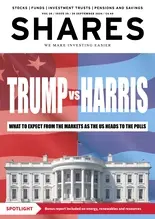
Stocks in London made little headway at Tuesday’s market open, amid a busy economic calendar and earnings from blue chip companies.
The FTSE 100 index opened up 9.70 points, 0.1%, at 7,709.11. The FTSE 250 was down 49.11 points, 0.3%, at 19,094.65, and the AIM All-Share was down 0.17 of a point at 764.55.
The Cboe UK 100 was up 0.1% at 768.83, the Cboe UK 250 was down 0.4% at 16,746.50, and the Cboe Small Companies was up 0.1% at 13,808.50.
On Tuesday’s economic calendar, there is a slew of manufacturing purchasing managers’ index readings, including the eurozone at 0900 BST, the UK at 0930 BST and the US at 1545 BST.
There has also already been some PMI data from across the globe.
China’s manufacturing sector fell into a mild state of contraction in July, whilst Japan’s manufacturing sector saw a marginal deterioration over the month. In Australia, the manufacturing sector remained in a downturn over July, but stabilised slightly from the prior month.
In Asia on Tuesday, the Nikkei 225 index in Tokyo was up 0.9%. In China, the Shanghai Composite was flat, while the Hang Seng index in Hong Kong was down 0.4%. The S&P/ASX 200 in Sydney closed up 0.5%.
In early UK economic news, house prices fell at the fastest annual rate in 14 years in July, according to Nationwide.
Property values declined by 3.8% on average annually in July, marking the weakest reading since July 2009, Nationwide Building Society said.
In June, prices had fallen 3.5% annually. House prices dropped by 0.2% month-on-month in July, to reach £260,828 on average, after rising 0.1% in June. The price of a typical home is now 4.5% below the August 2022 peak, Nationwide said.
Robert Gardner, Nationwide’s chief economist, said: ‘Investors’ views about the likely path of UK interest rates have been volatile in recent months.’
There will be another Bank of England interest rate decision on Thursday. The BoE is all but certain to raise rates by 25 basis points from 5.00% currently.
On the back of the data, housebuilders lacked direction in early trading. Persimmon fell by 0.5% and Taylor Wimpey shed 0.2%, whilst Barratt Developments was up 0.2%.
Meanwhile, the Reserve Bank of Australia left its key interest rate unchanged Tuesday, with the central bank saying previous hikes were ‘working’ but the outlook was uncertain.
The pause is the second in a row, following a string of rises aimed at taming runaway prices. The central bank left the cash rate target at 4.10% and the interest rate paid on exchange settlement balances unchanged at 4.00%.
In further UK news, shop price inflation decelerated in July hitting its lowest level this year as retailers mitigated the wet weather by offering larger discounts.
According to the latest British Retail Consortium-NielsenIQ tracker, annual shop price inflation cooled to 7.6% in July, down from 8.4% in June. This is below the three-month average rate of 8.4%, taking shop price inflation to its lowest level this year.
Food inflation eased to 13.4% in July, down from 14.6% in June, the third consecutive deceleration in the food category and the lowest level since December. It was below the 3-month average rate of 14.5%.
Elsewhere in the FTSE 100, Fresnillo lost 8.1%.
The London-based precious metals group reported that revenue in the six months ended June 30 rose to $1.34 billion from $1.26 billion a year ago. However, pretax profit fell to $81.2 million from $218.2 million.
Fresnillo declared a 1.40 US cents interim dividend, down 59% from 3.4 cents year-on-year.
BP was up 1.6%.
BP said second quarter attributable profit came in at $1.79 billion, down considerably from $9.26 billion a year earlier and from $8.22 billion in the first quarter of 2023. Underlying replacement cost profit in the quarter fell to $2.59 billion, down from $8.45 billion year-on-year and $4.96b in quarter one.
The oil major declared a dividend of 13.88 US cents, up from 11.466 cents a year ago.
It also announced that a new share buyback programme will be completed before reporting third quarter results. The buyback will be for a further $1.5 billion shares, down slightly from the $1.75 billion share buyback just completed.
Looking ahead, BP kept its guidance unchanged, with $4.0 billion per annum in buybacks.
In the FTSE 250 index, Domino’s Pizza rose 6.5%.
In the 26 weeks ended June 25, the company reported a 20% jump in revenue to £332.9 million from £278.3 million a year earlier.
Pretax profit nearly doubled to £80.2 million from £42.1 million.
Interim Chief Executive Officer Elias Diaz Sese said: ‘We have delivered a strong first half of 2023 with continued growth in orders and sales. Thanks to our alignment with our brilliant franchise partners, we have been able to accelerate our progress on the strategic initiatives set out at the beginning of the year, with a significant acceleration in store openings, greater app penetration and material improvements in delivery times.’
In European equities on Tuesday, the CAC 40 in Paris was down 0.2%, while the DAX 40 in Frankfurt was down 0.5%.
The pound was quoted at $1.2828 early on Tuesday in London, down compared to $1.2860 at the equities close on Monday. The euro stood at $1.0978, lower against $1.1027. Against the yen, the dollar was trading at JP¥142.69, up compared to JP¥142.12.
In the US on Monday, Wall Street ended higher, with the Dow Jones Industrial Average up 0.3%, whilst both the S&P 500 and the Nasdaq Composite were up 0.2%.
Brent oil was quoted at $84.88 a barrel early in London on Tuesday, lower from $85.08 late Monday. Gold was quoted at $1,955.32 an ounce, down against $1,969.90.
Copyright 2023 Alliance News Ltd. All Rights Reserved.




